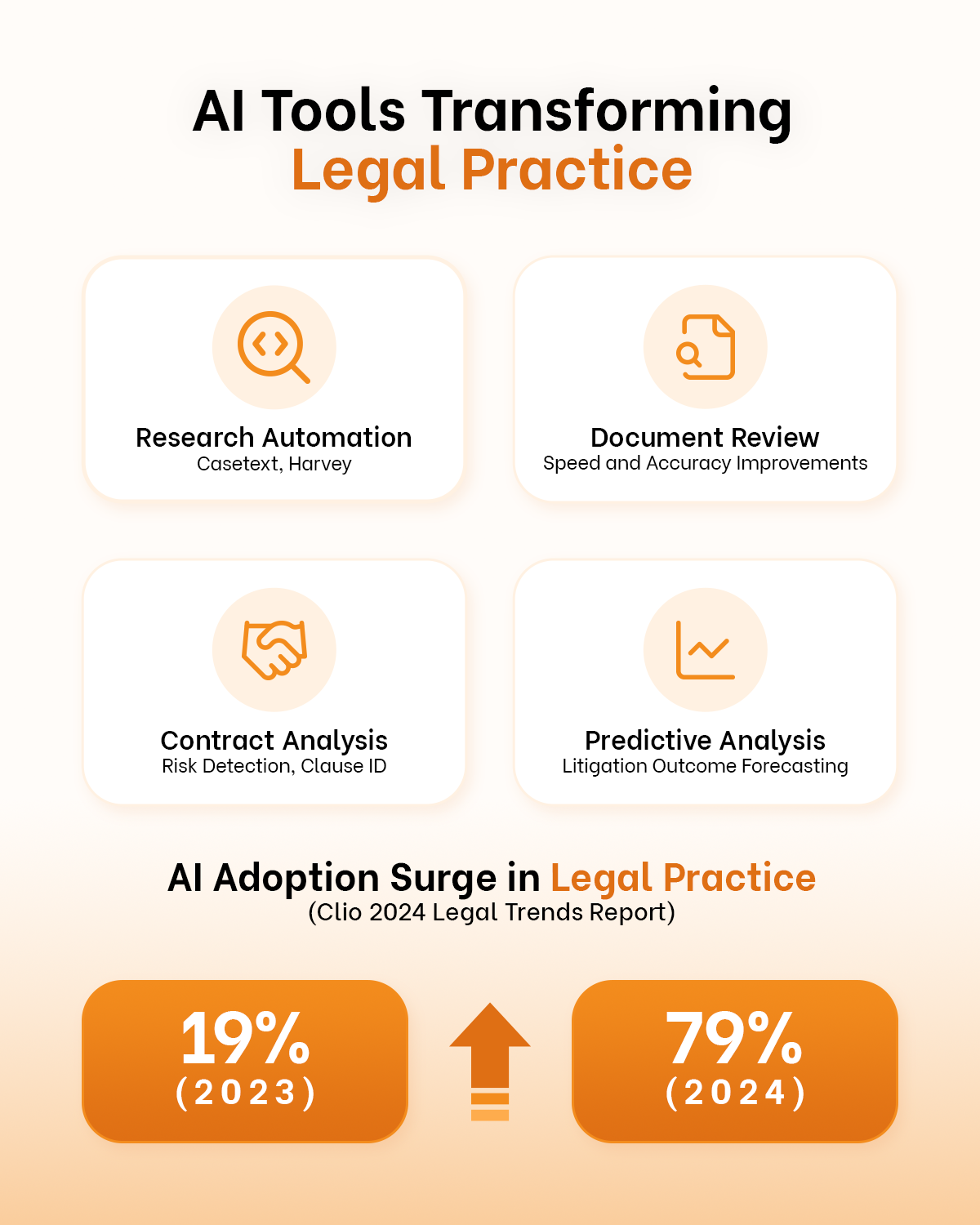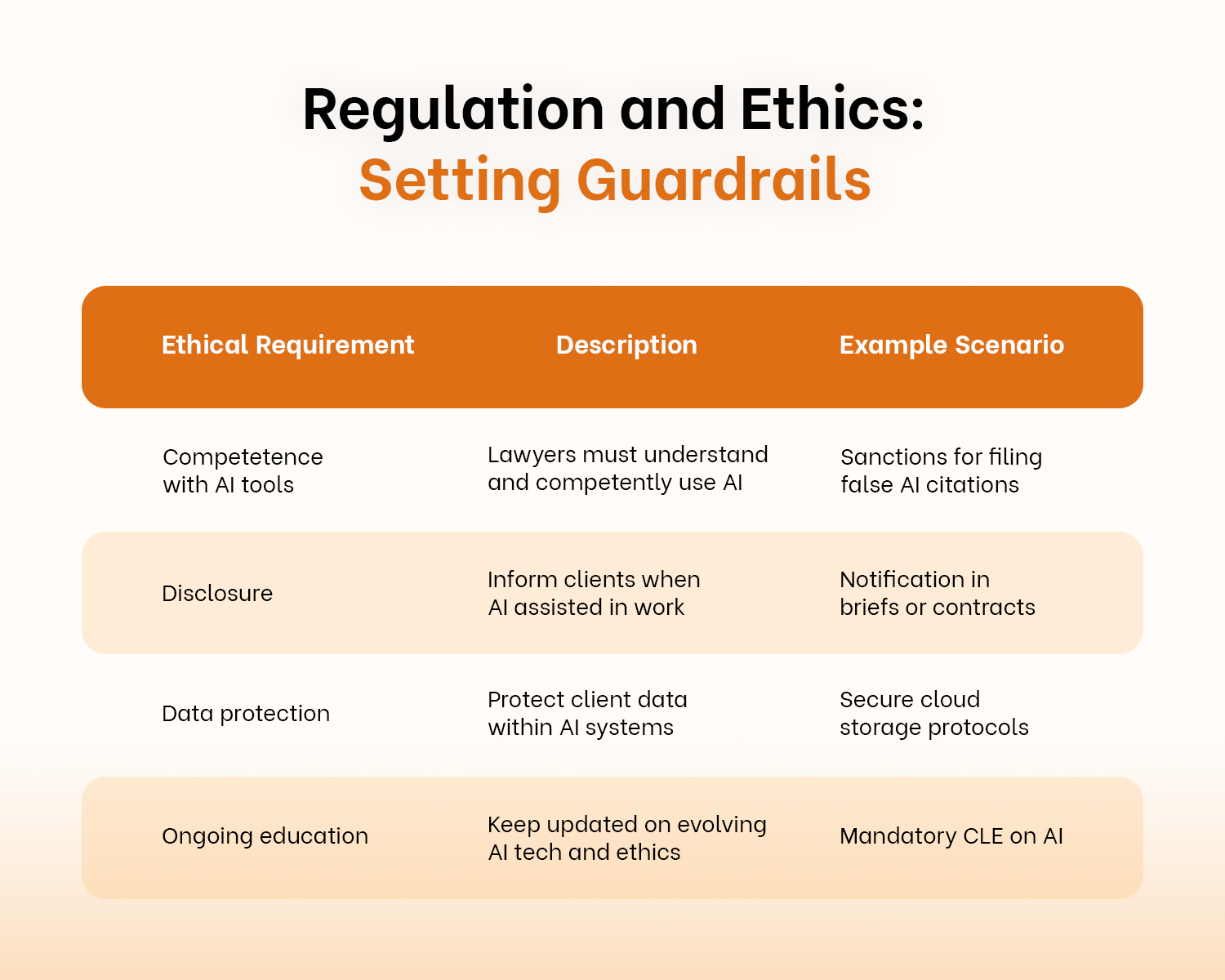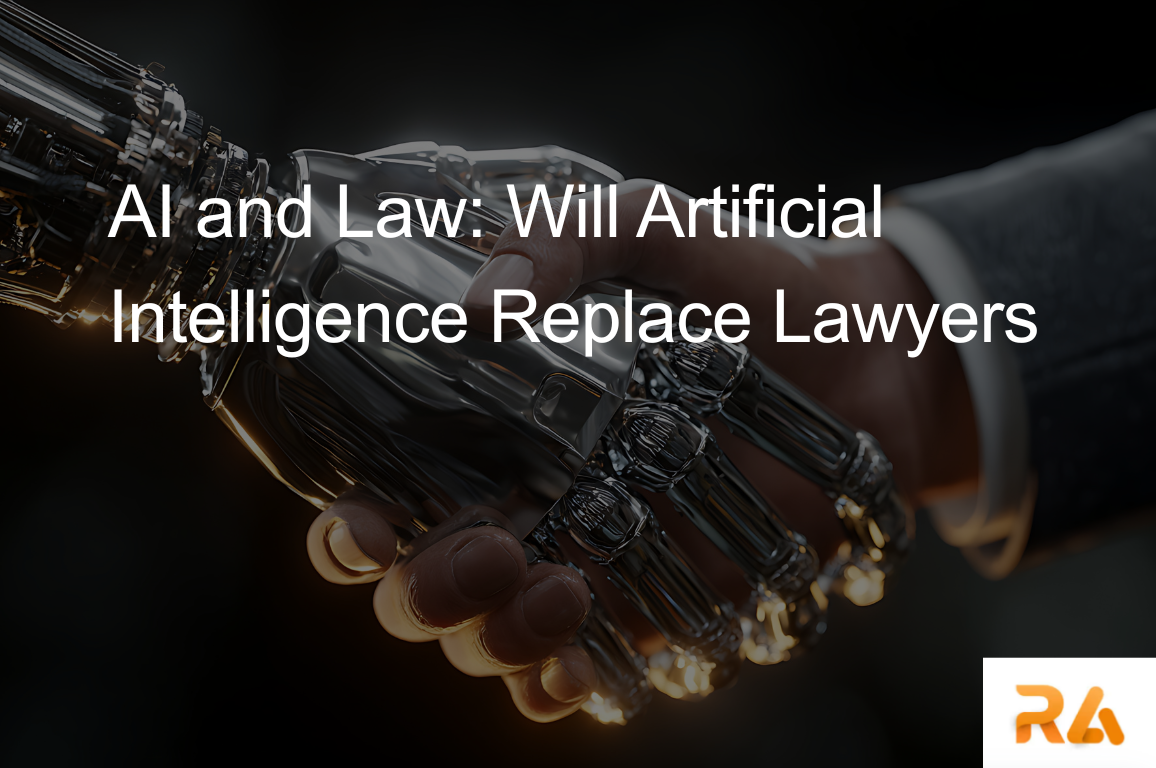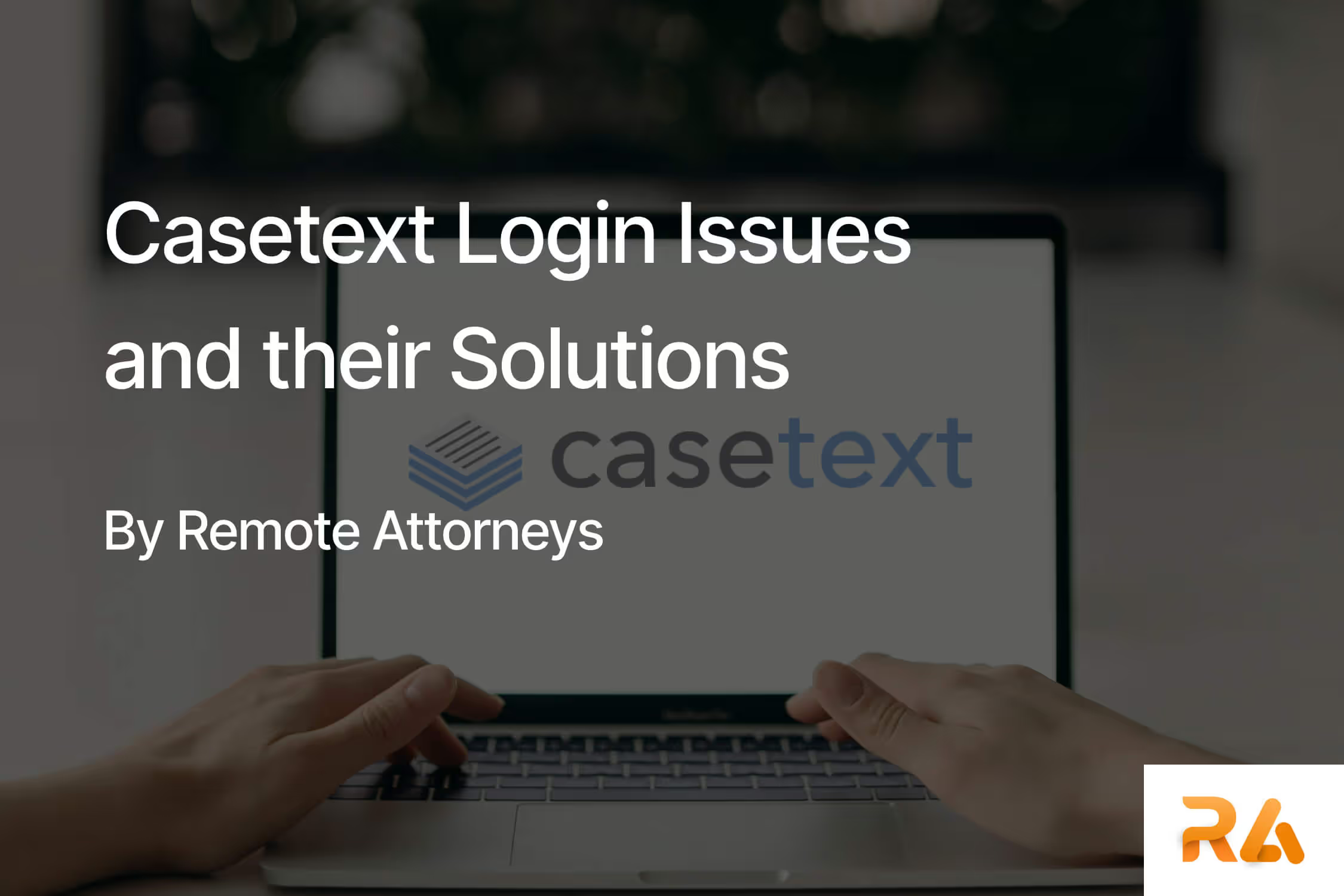The legal profession, built on precedent, reasoning, and persuasion, is facing a major shift: Artificial Intelligence.
From drafting routine contracts to reviewing thousands of discovery documents in minutes, AI is rapidly taking over tasks that were once assigned to junior associates and paralegals. These tools are no longer just supporting attorneys; they are performing core legal work with increasing accuracy and speed.
As automation expands into research, litigation analysis, and even client-facing communication, many are asking the question: if AI can handle the work of an entry-level lawyer, how long until it replaces the role entirely?
How AI Is Already Changing the Practice of Law
AI is now a practical part of law firm operations. Platforms like Harvey, CoCounsel, and Casetext instantly generate research summaries and draft memos. Machine learning tools handle document review faster and more accurately than large human teams, while contract analysis software such as Kira and Luminance quickly identifies risks and missing terms across thousands of agreements. Predictive analytics software uses case history and judicial data to estimate litigation outcomes.
Predictive analytics adds another layer of intelligence, allowing firms to estimate litigation outcomes based on historical data and judicial behavior. Combined, these tools significantly cut costs, improve consistency, and shorten turnaround times; helping firms manage heavy workloads with smaller, tech-enabled teams.
According to Clio’s 2024 Legal Trends Report, AI adoption among legal professionals surged from just 19% in 2023 to 79% in 2024, reflecting how rapidly these tools are reshaping modern legal practice.

The Limits of What AI Can Do
AI performs analytical work, but it lacks judgment, ethics, and empathy. Law is not just a technical exercise; it requires reasoning through complex human issues. AI cannot advise a nervous client, weigh competing moral considerations, or negotiate with sensitivity.
It also struggles with context. A human attorney understands tone, credibility, and intent, qualities that machines cannot infer from text. Legal advocacy relies on trust and persuasion, both of which depend on human insight. AI can produce drafts, but only lawyers can apply discretion, interpret law, and take responsibility for outcomes.
The Real Impact: A Changing Legal Career Path
AI will not erase lawyers, but it will change how they begin their careers. Entry-level roles focused on research and drafting are the most vulnerable. While a 2025 National Bureau of Economic Research study found modest 3% average productivity gains across occupations, law firms implementing AI for targeted tasks report more substantial improvements, with some achieving up to 40% reduction in document review time and 50% reduction in contract review time.
According to Clio's 2024 Legal Trends Report, 82% of legal professionals using AI report increased overall efficiency, with 65% saving between one and five hours weekly.

Regulation and Ethics: Setting Guardrails
AI’s growing influence raises essential questions about accountability and trust. In the landmark case Mata v. Avianca, Inc. (2023), attorneys were sanctioned $5,000 each by a federal judge for filing briefs containing AI-generated citations that did not exist. Incidents like these highlight the need for clear ethical boundaries.
Bar associations are already responding. Under the ABA’s Model Rule 1.1, lawyers are required to maintain competence, which now includes understanding the technology they use. Future regulations will likely require:
- Disclosure when AI assists in legal work
- Stronger data protection standards
- Continuous professional education on AI tools
Ethical compliance is non-negotiable. Lawyers must verify all AI-generated content, maintain confidentiality, and ensure that automation enhances accuracy rather than undermining it.

How Lawyers Who Use AI Are Leading the Way
The divide in the legal industry will not be between humans and machines but between those who use AI effectively and those who do not. Lawyers who adopt technology gain real advantages.
Contract analysis shows even bigger gains - some firms report a 50% reduction in review time. A contract portfolio that took 100 hours to analyze manually now takes 50. That's not just faster; it's the difference between taking on new clients or turning them away.
Did you know: According to Clio’s 2024 Legal Trends Report, 65% of legal professionals using AI save 1–5 hours per week. For a mid-level associate billing at $400/hour, that’s $2,000–$10,000 in recovered billable time weekly, or $104K–$520K annually per attorney. Multiply that across a team, and the numbers compound quickly.
Firms using AI for document review report up to 40% time reductions. A discovery project that would've taken a team of three associates 80 hours each (240 hours total) now takes 144 hours. That’s 96 hours freed up for depositions, strategy sessions, and client counseling.
Source: Clio’s 2024 Legal Trends Report
AI Tools Transforming Legal Practice:
Leading law firms are leveraging specialized AI platforms to enhance their capabilities:
- Legal Research & Writing: Harvey, CoCounsel (by Casetext), and Casetext provide AI-powered case law research, generate legal memos, and draft initial briefs in minutes rather than hours.
- Contract Analysis: Kira Systems and Luminance use machine learning to review thousands of contracts, identify risks, flag missing clauses, and extract key terms with greater accuracy than manual review.
- Document Review & Discovery: Relativity and Logikcull analyze discovery documents, identify privileged materials, and surface relevant evidence at a fraction of the time traditional methods require.
- Legal Practice Management: Clio Manage AI and MyCase automate scheduling, deadline tracking, client communications, and billing, reducing administrative burden.
- Predictive Analytics: Lex Machina and Pre/Dicta use AI to forecast case outcomes, estimate settlement ranges, and identify winning arguments based on historical judicial data.
By automating research and administrative work, attorneys can focus on higher-value tasks such as advising clients and developing legal strategy. AI handles the heavy data processing, while lawyers interpret and act on that information.
What This Means for Your Firm
AI won't replace lawyers. It'll redefine what makes them valuable. Machines process information. They don't replace the judgment, ethics, or advocacy that define legal practice. The firms that thrive will combine human insight with technological precision.
For individual attorneys: learn to work with AI. Understand its limits, verify its output, and use it to improve performance. For firms: integrate technology responsibly while maintaining the human trust that law depends on.
The lawyers who succeed will be the ones who know how to use AI tools while still thinking like lawyers. AI will change how you work, but not what makes you valuable.

Future-Proof Your Legal Team with Remote Attorneys
Remote Attorneys provides you with access to U.S. law-experienced virtual attorneys who are trained to work efficiently with AI-powered tools. Accelerate turnaround times, reduce overhead, and maintain the highest standards of legal work, without the hiring burden.
Book a call today to learn how we can support your practice.



.webp)
